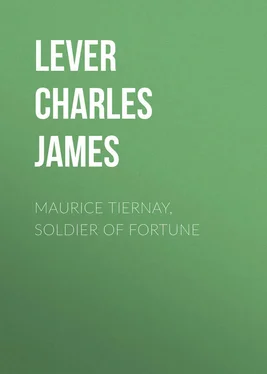Charles Lever - Maurice Tiernay, Soldier of Fortune
Здесь есть возможность читать онлайн «Charles Lever - Maurice Tiernay, Soldier of Fortune» — ознакомительный отрывок электронной книги совершенно бесплатно, а после прочтения отрывка купить полную версию. В некоторых случаях можно слушать аудио, скачать через торрент в формате fb2 и присутствует краткое содержание. Жанр: literature_19, foreign_antique, foreign_prose, на английском языке. Описание произведения, (предисловие) а так же отзывы посетителей доступны на портале библиотеки ЛибКат.
- Название:Maurice Tiernay, Soldier of Fortune
- Автор:
- Жанр:
- Год:неизвестен
- ISBN:нет данных
- Рейтинг книги:3 / 5. Голосов: 1
-
Избранное:Добавить в избранное
- Отзывы:
-
Ваша оценка:
- 60
- 1
- 2
- 3
- 4
- 5
Maurice Tiernay, Soldier of Fortune: краткое содержание, описание и аннотация
Предлагаем к чтению аннотацию, описание, краткое содержание или предисловие (зависит от того, что написал сам автор книги «Maurice Tiernay, Soldier of Fortune»). Если вы не нашли необходимую информацию о книге — напишите в комментариях, мы постараемся отыскать её.
Maurice Tiernay, Soldier of Fortune — читать онлайн ознакомительный отрывок
Ниже представлен текст книги, разбитый по страницам. Система сохранения места последней прочитанной страницы, позволяет с удобством читать онлайн бесплатно книгу «Maurice Tiernay, Soldier of Fortune», без необходимости каждый раз заново искать на чём Вы остановились. Поставьте закладку, и сможете в любой момент перейти на страницу, на которой закончили чтение.
Интервал:
Закладка:
To me the spectacle had all the fascination that scenes of horror exercise over the mind of youth. I knew nothing of the terrible conflict, nothing of the fierce passions enlisted in the struggle, nothing of the sacred names so basely polluted, nothing of that remorseless vengeance with which the low born and degraded were still hounded on to slaughter. It was a solemn and a fearful sight, but it was no more; and I gazed upon every detail of the scene with an interest that never wandered from the spot whereon it was enacted. If the parade of soldiers, of horse, foot, and artillery, gave these scenes a character of public justice, the horrible mobs, who chanted ribald songs, and danced around the guillotine, suggested the notion of popular vengeance; so that I was lost in all my attempts to reconcile the reasons of these executions with the circumstances that accompanied them.
Not daring to inform the Père Michel of where I had been, I could not ask him for any explanation; and thus was I left to pick up from the scattered phrases of the crowd what was the guilt alleged against the criminals. In many cases the simple word ‘Chouan,’ of which I knew not the import, was all I heard; in others, jeering allusions to former rank and station would be uttered; while against some the taunt would imply that they had shed tears over others who fell as enemies of the people, and that such sympathy was a costly pleasure to be paid for but with a life’s-blood. Such entire possession of me had these awful sights taken, that I lived in a continual dream of them. The sound of every cart-wheel recalled the dull rumble of the hurdle – every distant sound seemed like the far-off hum of the coming multitude – every sudden noise suggested the clanking drop of the guillotine! My sleep had no other images, and I wandered about my little round of duties pondering over this terrible theme.
Had I been less occupied with my own thoughts, I must have seen that the Père Michel was suffering under some great calamity. The poor priest became wasted to a shadow; for entire days long he would taste of nothing; sometimes he would be absent from early morning to late at night, and when he did return, instead of betaking himself to rest, he would drop down before the crucifix in an agony of prayer, and thus spend more than half the night. Often and often have I, when feigning sleep, followed him as he recited the litanies of the breviary, adding my own muttered prayers to his, and beseeching for a mercy whose object I knew not.
For some time his little chapel had been closed by the authorities; a heavy padlock and two massive seals being placed upon the door, and a notice, in a vulgar handwriting, appended, to the effect that it was by the order of the Commissary of the Department. Could this be the source of the père’s sorrow? or did not his affliction seem too great for such a cause? were questions I asked myself again and again.
In this state were matters, when one morning – it was a Saturday – the priest enjoined me to spend the day in prayer, reciting particularly the liturgies for the dead, and all those sacred offices for those who have just departed this life.
‘Pray unceasingly, my dear child – pray with your whole heart, as though it were for one you loved best in the world. I shall not return, perhaps, till late to-night; but I will kiss you then, and to-morrow we shall go into the woods together.’
The tears fell from his cheek to mine as he said this, and his damp hand trembled as he pressed my fingers. My heart was full to bursting at his emotion, and I resolved faithfully to do his bidding. To watch him as he went, I opened the sash, and as I did so, the sound of a distant drum, the well-known muffled roll, floated on the air, and I remembered it was the day of the guillotine – that day in which my feverish spirit turned, as it were in relief, to the reality of blood. Remote as was the part of the city we lived in, I could still mark the hastening steps of the foot-passengers, as they listened to the far-off summons, and see the tide was setting towards the fatal Place de Grève. It was a lowering, heavy morning, overcast with clouds, and on its loaded atmosphere sounds moved slowly and indistinctly; yet I could trace through all the din of the great city, the incessant roll of the drums, and the loud shouts that burst forth, from time to time, from some great multitude.
Forgetting everything save my intense passion for scenes of terror, I hastened down the stairs into the street, and at the top of my speed hurried to the place of execution. As I went along, the crowded streets and thronged avenues told of some event of more than common interest; and in the words which fell from those around me, I could trace that some deep Royalist plot had just been discovered, and that the conspirators would all on that day be executed. Whether it was that the frequent sight of blood was beginning to pall upon the popular appetite, or that these wholesale massacres interested less than the sight of individual suffering, I know not; but certainly there was less of exultation, less of triumphant scorn in the tone of the speakers. They talked of the coming event as of a common occurrence, which, from mere repetition, was gradually losing interest.
‘I thought we had done with these Chouans,’ said a man in a blouse, with a paper cap on his head. ‘ Pardie! they must have been more numerous than we ever suspected.’
‘That they were, citizen,’ said a haggard-looking fellow, whose features showed the signs of recent strife; ‘they were the millions who gorged and fed upon us for centuries – who sipped the red grape of Bordeaux, while you and I drank the water of the Seine.’
‘Well, their time is come now,’ cried a third.
‘And when will ours come?’ asked a fresh-looking, dark-eyed girl, whose dress bespoke her trade as a flower-girl, ‘or do you call this our time, my masters, when Paris has no more pleasant sight than blood, nor any music save the “Ça ira” that drowns the cries of the guillotine? Is this our time, when we have lost those who gave us bread, and got in their place only those who would feed us with carnage?’
‘Down with her! down with the Chouane! à bas la Royaliste! ’ cried the pale-faced fellow; and he struck the girl with his fist upon her face, and left it covered with blood.
‘To the Lantern with her – to the Seine!’ shouted several voices; and now, rudely seizing her by the shoulders, the mob seemed bent upon sudden vengeance; while the poor girl, letting fall her basket, begged with clasped hands for mercy.
‘See here, see here, comrades,’ cried a fellow, stooping down among the flowers, ‘she is a Royalist: here are lilies hid beneath the rest.’
What sad consequences this discovery might have led to, there is no knowing; when, suddenly, a violent rush of the crowd turned every thought into a different direction. It was caused by a movement of the Gendarmerie à cheval , who were clearing the way for the approaching procession. I had just time to place the poor girl’s basket in her hands, as the onward impulse of the dense mob carried me forward. I saw her no more. A flower – I know not how it came there – was in my bosom, and seeing that it was a lily, I placed it within my cap for concealment.
The hoarse clangour of the bassoons – the only instruments which played during the march – now told that the procession was approaching; and then I could see, above the heads of the multitude, the leopard-skin helmets of the dragoons, who led the way. Save this I could see nothing, as I was borne along in the vast torrent towards the place of execution. Slowly as we moved, our progress was far more rapid than that of the procession, which was often obliged to halt from the density of the mob in front. We arrived, therefore, at the Place a considerable time before it; and now I found myself beside the massive wooden railing placed to keep off the crowd from the space around the guillotine.
Читать дальшеИнтервал:
Закладка:
Похожие книги на «Maurice Tiernay, Soldier of Fortune»
Представляем Вашему вниманию похожие книги на «Maurice Tiernay, Soldier of Fortune» списком для выбора. Мы отобрали схожую по названию и смыслу литературу в надежде предоставить читателям больше вариантов отыскать новые, интересные, ещё непрочитанные произведения.
Обсуждение, отзывы о книге «Maurice Tiernay, Soldier of Fortune» и просто собственные мнения читателей. Оставьте ваши комментарии, напишите, что Вы думаете о произведении, его смысле или главных героях. Укажите что конкретно понравилось, а что нет, и почему Вы так считаете.












